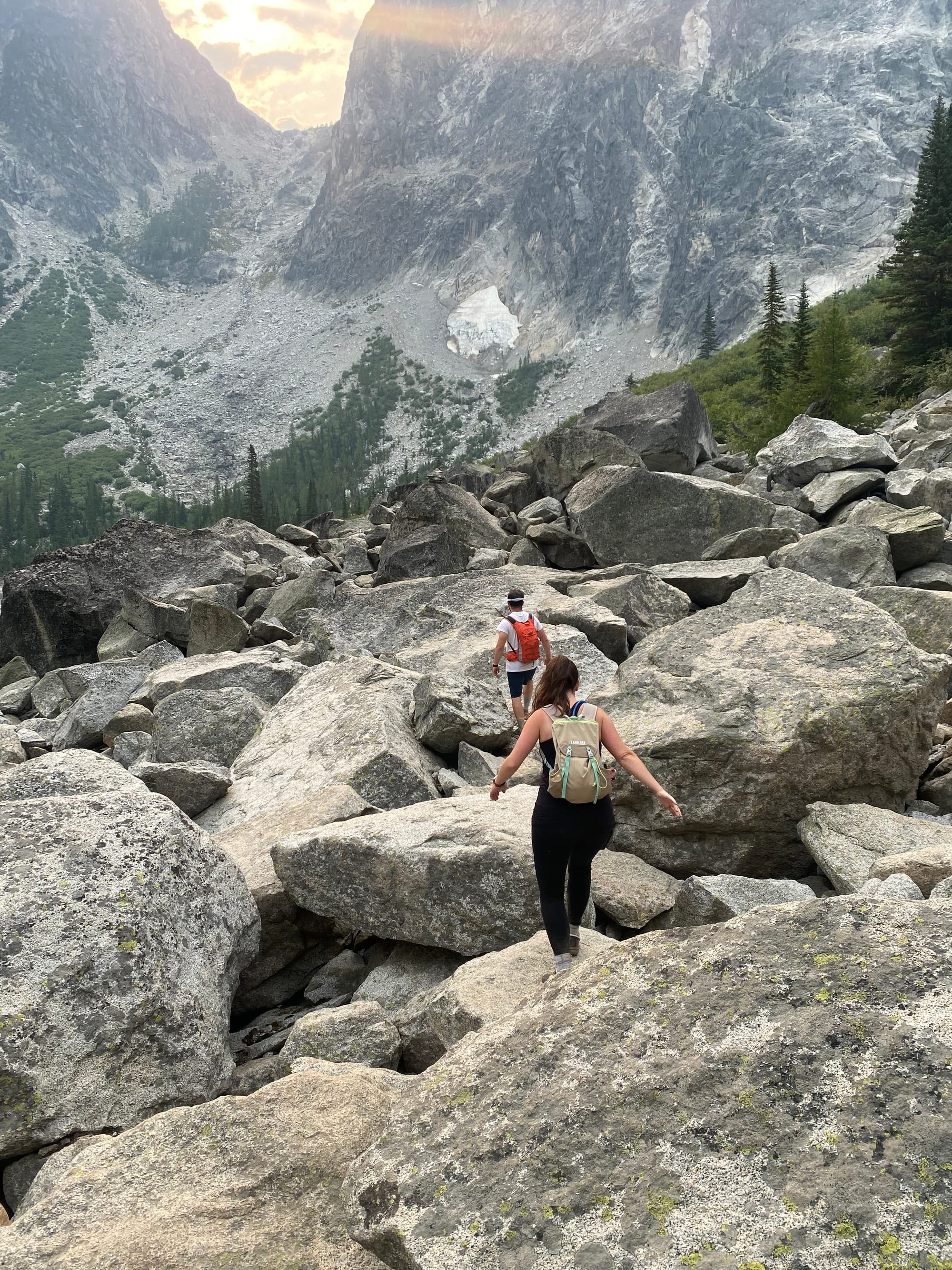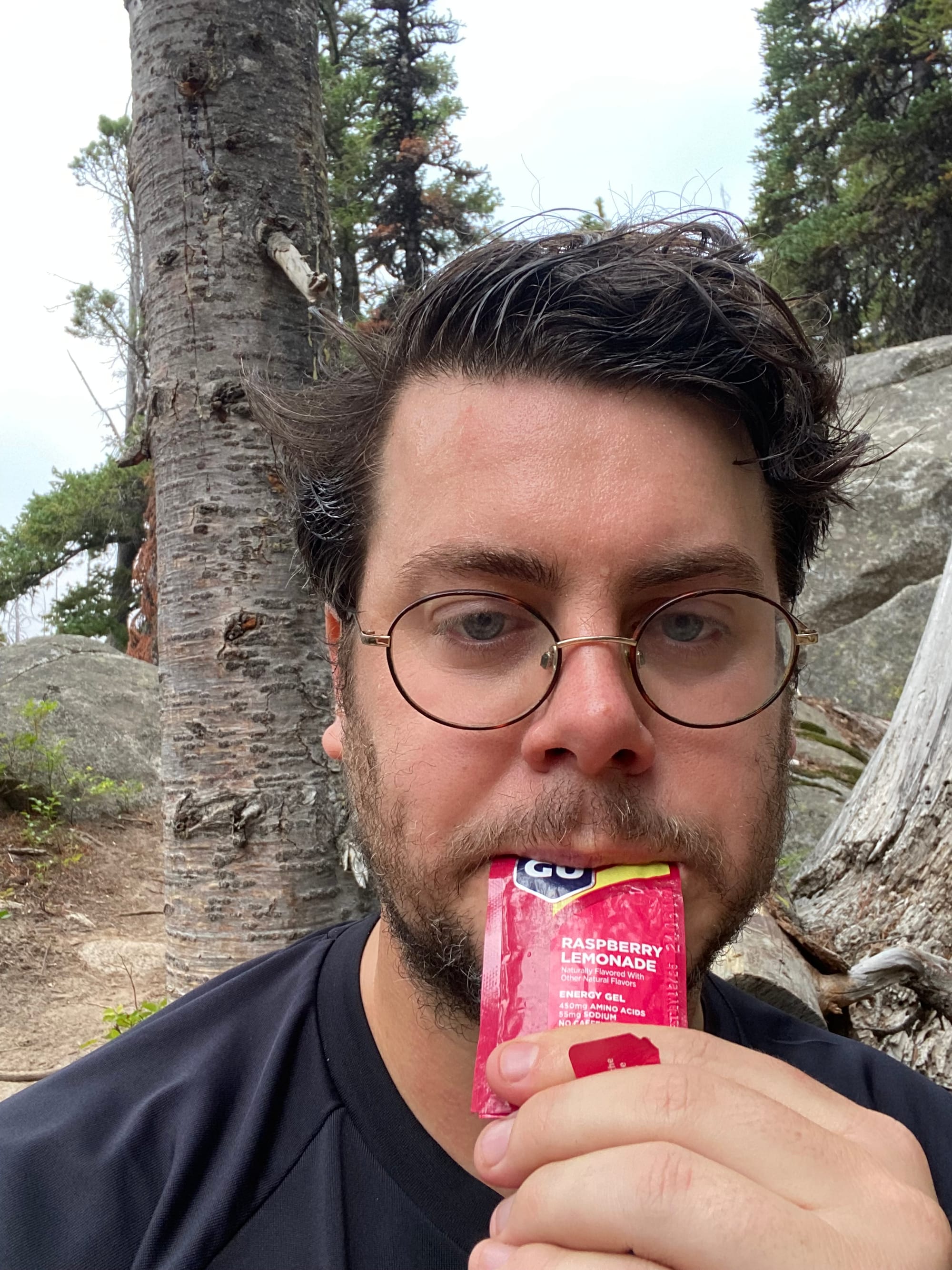#18: Traumatized by the great outdoors
Death By Consumption
9/3/24 - 9/9/24
It’s going to be a shorter than usual one this week, as my consumption was relatively low due to me doing that thing I’ve heard of called Being In Nature over the weekend. I flew to Seattle on Friday to hike and backpack a place in the mountains called The Enchantments with my sisters, my brother-in-law, and some of their friends. For a place with a cute little name like The Enchantments, this was the most psychotically difficult thing I’ve ever done. And lest you think I’m exclusively a whiny slouch (though I will cop to being that most of the time), I have run a marathon in North Korea! And yet this was harder and more intense! I am potentially traumatized after this weekend. Is there someone you can sue when the wilderness gives you PTSD?
Here’s how the weekend went: hike uphill with a 35-pound backpack for 5 miles. Set up camp, poop in the woods, eat dehydrated slop out of a bag, pass out at sunset. Wake up before dawn, eat more slop, hike 15 miles(!), half of which involves climbing Aasgard Pass, essentially the equivalent of climbing up from Denver‘s elevation to Aspen’s in about 2 hours of brutal, terrifying scrambling. Then you have to somehow get back down that same distance without slipping on the loose gravel and plunging to your death (which happens more often than you’d like! In fact, a search-and-rescue helicopter was circling overhead as we descended! Not reassuring!). By the time you get back to camp, your legs are something beyond jelly, perhaps a new state of matter yet to be discovered, and you can be sure your knees will never, ever be the same. Eat more slop even though you want to puke, poop in the woods again, pass out. Wake up, pack up your stuff — shoving your tent and sleeping bag and pad into their carrying bags that are always the perfectly-too-small size to infuriate you to the point of madness — eat your final meal of slop, put your pack on your back even though your body is screaming at you in horror, and hike out with all your stuff on your trembling baby-deer legs the final 5 miles, until you finally see the car and collapse into tears.

When I agreed to do this trip, I pictured myself experiencing revelation after revelation out there. Marveling at my small place in the world’s magnificent ecosystem. Appreciating the beauty of everything from enormous mountains to delicate flora. Discovering new ways to see the world, and myself. Perhaps reaching my hand out to allow a small bird to land on a finger.
Instead, it was mostly a lot of trudging along, my eyes focused on the ground one foot in front of me, scanning for rocks or roots that might trip me, thinking profound thoughts like, “My back hurts,” and, “Is this next step the one that finally shatters my kneecap to dust?”
(Was our experience made harder by the fact that two members of our party fully just left on day two, leaving us to pack and carry not only our own stuff but theirs as well on the way out? Possibly! Who could ever know!)
My advice? Stay inside and look at nature through a window or a device.
Erasure, by Percival Everett (2001) — paperback
I am a big fan of Percival Everett, but had never read his most famous book, so I had to rectify that. No surprises here: it’s great! I’m glad the publishers haven’t changed the title to “American Fiction” after the movie version titled that won an Oscar (I will never forgive Patricia Highsmith’s publishers for changing The Price of Salt to Carol after the movie btw). This book is funny and poignant and ruthless, especially if you’re a Precious: Based on the Novel Push by Sapphire hater like me. No one is funnier when pissed off than Percival Everett!
Grief Is For People, by Sloane Crosley (2024) — hardcover
Thank you to my friend Amy for recommending this, a weirdly entertaining memoir about losing your best friend to suicide. Sloane Crosley’s books are known for their humor, and somehow this book is no different. In some instances writing mere months after her best friend killed himself, Crosley excavates her own feelings about it in a way I can imagine was lazily described as “raw and unflinching” a lot. I don’t normally reach for grief memoirs because, like, why do that to yourself, but this one is a notable exception!
“Why A.I. Isn’t Going to Make Art” by Ted Chiang – in The New Yorker
This is a really great, non-Luddite evisceration of the belief that AI is doing anything “creative” in the artistic space. Only Ted Chiang can be this technically proficient while also so creative in his writing, drawing a lot of very intelligent, very evocative comparisons to help make his argument stronger, at times comparing AI to butterflies evolving spots that look like a predators’ eyes, or to lab rats learning how to drive cars. (This is also a good reminder that if you haven’t read Ted Chiang’s two collections of short stories, you should do so. Immediately.)
Honestly, if you care at all about AI or creativity, you should just read the whole article, because I keep going back to it to find a quote to drop in here and I find myself wanting to drop entire paragraphs in (very ChatGPT of me, actually). Like this:
Teachers don’t ask students to write essays because the world needs more student essays. The point of writing essays is to strengthen students’ critical-thinking skills; in the same way that lifting weights is useful no matter what sport an athlete plays, writing essays develops skills necessary for whatever job a college student will eventually get. Using ChatGPT to complete assignments is like bringing a forklift into the weight room; you will never improve your cognitive fitness that way.
Or this kicker:
The task that generative A.I. has been most successful at is lowering our expectations, both of the things we read and of ourselves when we write anything for others to read. It is a fundamentally dehumanizing technology because it treats us as less than what we are: creators and apprehenders of meaning. It reduces the amount of intention in the world.
Raspberry Lemonade Gu — in the woods
If you’re not familiar with Gu, you probably live a blissful life! If you are familiar, you probably do extreme things like running marathons or, like, summiting mountains rather than just waiting for them to build a gondola up it. But since I was going to do one of those extreme, stupid things, and I am a man approaching the age of 40 and I didn't want to sweat out every last electrolyte and have my heart stop, I bought somewhere between 15 and 300 packets of Gu at the Seattle REI. Just to be safe.
The first Gu was, admittedly, kind of fantastic. I felt an immediate rush of energy, as if the previous few miles had never happened. Sure, the texture is as if you let the alien from Alien drool into your mouth, but it's over quickly enough. But by the end of the weekend, I dreaded my regular Gu refuelings. The stupid little packets make it impossible to not get at least some Gu on your hands which, in the forest, means you spend more time than you'd like licking sticky Gu off dirt-coated fingers. You also wake up at 3am in your tent, suddenly worried the bears can smell the Gu that got all over your backpack. Sure, the Gu probably saved my life many times over, but at what cost?

Thankfully, I don't plan on ever leaving my home again, so my Gu days are over.